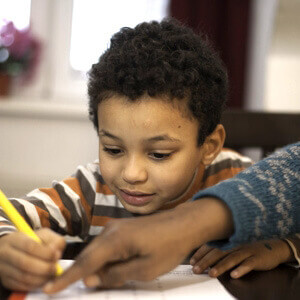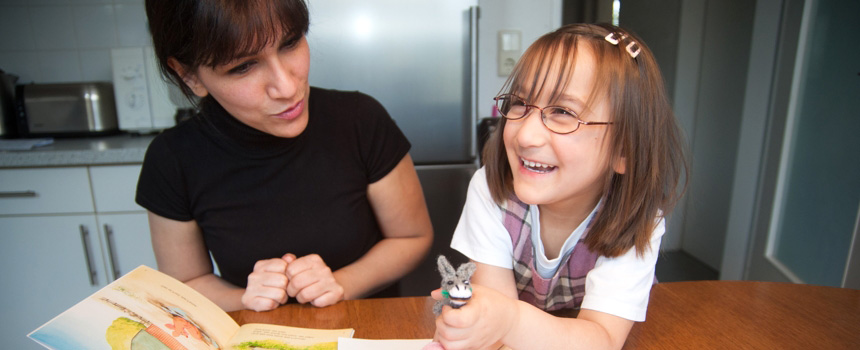 Learning together for school
Learning together for school
Reducing educational inequality in Germany
Tariq is almost 6 years old and he wants to go to school next summer. His family is from Afghanistan and his parents hardly speak German. Because of the war, his father was only able to attend school for three years. His mother wants her son to have a better life and a good education. The doctor tells them about HIPPY, a parent-child programme that playfully and successfully prepares Tariq for school. Tariq is as curious as his parents. Every week they receive a visit from a supporter of the HIPPY project. She brings along children’s books and exercise books for Tariq. They all practice together – reading, drawing, speaking and playing. The family has a lot of fun and they all learn together. Then it's time: Tariq passes the aptitude test and starts school. He has a huge smile on his face and his parents are also very proud.
Necessity
Early-age support for children and families in challenging circumstances throughout Germany
Activity
Social and municipal institutions offer the HIPPY family programme and help to prepare parents and school-age children for the beginning of their school life.
Countable effort
Number of hours that families will benefit from the HIPPY Programme.
Result
Children learn key skills before they start going to school and together with their parents they are brought up to speed.
Systemic effect
Improved opportunities for learning and the future for any child, regardless of social status, income or origin.
Background
Education is an important resource in a prosperous country like Germany. Early education is particularly important for development and equal opportunities. Some children can already write and play the piano when they start school. Other first-graders find it difficult to hold a pen or sit still. It is often in the first years of life that the later path of a child is decided.
In Germany, educational success is closely linked to the parents’ social background and income, much more so than in other countries (OECD, 2018). There are parents who cannot support their children in their development without outside help. These children have no opportunities for training their fine motor skills, practicing reading or developing creativity. As a result, these children are much less likely to achieve A-Levels or any school-leaving qualification, with all the disadvantages for their personal future and for society.
The good deed
Supporters from the HIPPY programme visit families in need for several months before starting school and accompany them in the preparation and acquisition of central skills. Both parents and children benefit. The familiar environment at home, the trusting relationship with the incoming supporter and the regular practice with exciting children’s books and exercises both help to promote the children’s development. Mothers and fathers are strengthened in their self-confidence and children playfully learn important skills for starting school. The HIPPY programme prepares families for the transition to primary school, eases the children’s entry into their personal educational and life paths and reduces educational inequality.

AboutGermany
Berlin
Capital
82 521 653
Number of inhabitants
46.136
Gross domestic product per capita per year
5
Human Development Index
Education is a key resource in Germany. Nevertheless, spending on education is only 4.2% of GDP. This is even lower than the average of 5% for all 28 EU countries.
About the organization and further information
Association
IMPULS Deutschland Stiftung e.V.
Website
http://www.impuls-familienbildung.de
Initiative Transparente Zivilgesellschaft PHINEO-wirkt Siegel
Further information and source
- Bertelsmann Stiftung (Hrsg.), 2017. Armutsmuster in Kindheit und Jugend, Gütersloh
- OECD, 2018. Equity in Education: Breaking Down Barriers to Social Mobility.
- Autorengruppe Bildungsberichterstattung (Hrsg.), 2016. Bildung in Deutschland 2016
- Bundesministerium für Arbeit und Soziales (Hrsg.), 2017. Lebenslagen in Deutschland - Armuts- und Reichtumsberichterstattung der Bundesregierung
- Spieß C. Katharina, 2013. Investitionen in Bildung: Frühkindlicher Bereich hat großes Potential, DIW Wochenbericht Nr. 26/2013, S. 40-47, Berlin
- Berger E. et al, 2010. Wie hängen familiäre Veränderungen und und das mütterliche ...?, Vierteljahreshefte zur Wirtschaftsforschung, S. 27-44, Berlin
- Spieß C. Katharina, 2013. Investitionen in Bildung: Frühkindlicher Bereich hat großes Potential, DIW Wochenbericht Nr. 26/2013, S. 40-47, Berlin
- Berger E. et al, 2010. Wie hängen familiäre Veränderungen und und das mütterliche ...?, Vierteljahreshefte zur Wirtschaftsforschung, S. 27-44, Berlin
- Bertelsmann Stiftung (Hrsg.), 2017. Armutsmuster in Kindheit und Jugend, Gütersloh
- Bundesministerium für Arbeit und Soziales (Hrsg.), 2017. Lebenslagen in Deutschland - Armuts- und Reichtumsberichterstattung der Bundesregierung
- Autorengruppe Bildungsberichterstattung (Hrsg.), 2016. Bildung in Deutschland 2016
- OECD, 2018. Equity in Education: Breaking Down Barriers to Social Mobility.




